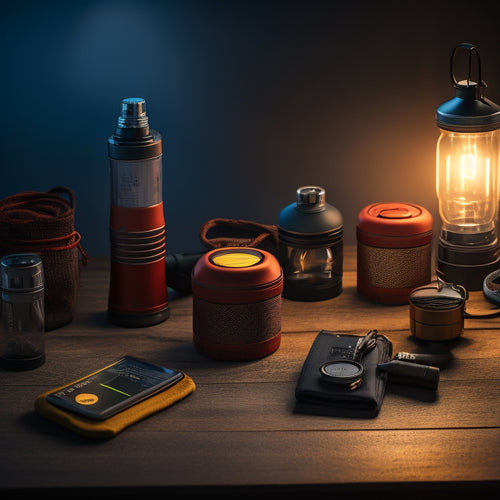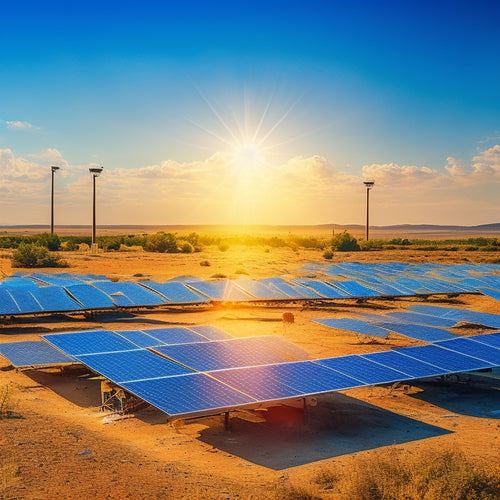
Solar Panels for Backup Power
Share
You invest in solar panels for backup power to guarantee that when the grid goes down, your home stays powered, safeguarding your comfort, safety, and productivity. With a solar backup system, you'll eliminate issues like lost productivity and spoiled food, and reduce your reliance on noisy, polluting generators. You'll have uninterrupted access to critical appliances like refrigerators and medical devices during outages. By integrating your solar panels with battery storage systems, you'll maximize renewable energy utilization and enhance your energy independence. Now that you've taken the first step towards reliable backup power, you can investigate how to optimize your system's performance and release its full potential.
The Essentials
- Solar panels provide reliable energy during outages, ensuring power availability and energy independence.
- Integration with battery storage systems enhances renewable energy utilization and reduces reliance on the grid.
- Solar backup systems ensure uninterrupted access to critical appliances, such as refrigerators and medical devices, during outages.
- Maximum power point tracking (MPPT) optimizes energy harvesting from solar panels, increasing energy output by up to 30%.
- A well-designed backup power system guarantees reliability during power outages, considering appliance wattages, peak power needs, and storage capacity.
Reliable Energy During Outages
You're no stranger to power outages, and you know how frustrating it can be to lose energy when you need it most.
With solar panels as a backup power source, you'll have power when you need it, ensuring your daily routine isn't disrupted. By investing in solar panels, you're fundamentally guaranteeing energy independence, which means you'll be prepared for the next outage.
With a Solar Power Backup system, you can say goodbye to the inconvenience of lost productivity, spoiled food, and compromised safety off-grid solar, and you'll reduce your reliance on noisy, polluting generators and the hassle of refueling them.
Power When You Need
How do you stay powered up when the grid goes down? With solar panels for backup power, you can rest assured that you'll have reliable energy when you need it most.
Solar storage systems allow you to store excess energy generated during the day for use during outages or at night. This means you can power critical appliances like refrigerators, medical equipment, and communication devices. By integrating a battery storage system into your solar setup, you'll access the full potential of renewable energy and create a more sustainable, dependable, and cost-effective power solution Renewable Energy Storage.
Grid integration is key to a seamless shift between grid power and backup power. When the grid goes down, your solar storage system kicks in, providing a smooth and reliable source of energy. This integration also allows you to sell excess energy back to the grid when it's up and running, offsetting your energy costs.
When the lights go out, you can count on your solar panels to provide power when you need it. With a well-designed solar storage system, you'll have the freedom to stay connected, stay safe, and stay comfortable, no matter what the grid is doing.
Energy Independence Guaranteed
Utilize the power of energy independence with a reliable solar backup system, ensuring uninterrupted access to critical appliances during outages.
With a solar-powered backup system, you're no longer at the mercy of grid outages, giving you the freedom to live life on your own terms. Imagine being able to power your essential appliances, such as refrigeration, lighting, and communication devices, even when the grid is down.
By leveraging home battery storage systems, you can reduce your reliance on the grid during power outages and lower your electricity bills by storing excess energy generated by your solar panels. This level of energy independence is particularly significant for those who opt for off-grid living.
By exploiting the power of sustainable technology, you can reduce your reliance on traditional energy sources and minimize your carbon footprint. A solar backup system provides a clean, renewable source of energy, ensuring that you're not only prepared for outages but also contributing to a more environmentally friendly future.
With a reliable solar backup system, you can rest assured that you'll have the power you need, when you need it. No more worrying about spoiled food or communication disruptions during extended outages.
You'll be in control, with the energy independence you deserve.
Zero Carbon Footprint
You're taking an essential step towards reducing your emissions today by investing in solar panels for backup power.
By utilizing clean energy from the sun, you're contributing to a significant decrease in greenhouse gas emissions that harm the environment.
With the ability to reduce energy bills and increase energy efficiency, you're not only saving money but also doing your part for the planet.
With clean energy solutions like solar power, you're well on your way to achieving a zero-carbon footprint and mitigating the impact of climate change.
Reducing Emissions Today
As the world shifts towards a more sustainable future, reducing emissions today is essential for achieving a zero-carbon footprint. You're likely aware that the environmental impact of human activities is significant, and it's up to you to take action.
By adopting sustainable practices and investing in renewable energy, you'll be doing your part to reduce your carbon footprint. Green technology has come a long way, making it easier than ever to implement eco-friendly solutions into your daily life.
You can start by reducing your energy consumption through energy conservation measures like turning off lights and appliances when not in use. Additionally, consider investing in solar panels or other forms of renewable energy to power your home.
These small changes can add up to make a big difference in pollution control. Every step you take towards reducing emissions today brings us closer to a future where climate action is the norm.
Clean Energy Solutions
One of the most effective clean energy solutions for achieving a zero-carbon footprint is utilizing solar power through solar panels. By capturing the power of the sun, you can greatly reduce your reliance on non-renewable resources and lower your environmental impact. Solar technology has come a long way, and with advancements in energy storage and grid integration, it's now possible to store excess energy generated during the day for use during the night or on cloudy days.
Solar power offers numerous benefits, including:
| Benefits | Description | Advantages |
|---|---|---|
| Renewable Resources | Capturing energy from the sun | Zero carbon emissions |
| Energy Conservation | Reducing energy consumption | Lower energy bills |
| Sustainable Practices | Environmentally friendly | Contributes to a cleaner environment |
| Solar Incentives | Government incentives for solar adoption | Financial benefits |
With smart homes and solar innovations, you can monitor and control your energy usage, making it easier to achieve a zero-carbon footprint. By adopting solar power, you'll not only reduce your environmental impact but also contribute to a sustainable future.
Maximum Power Point Tracking
You'll want to guarantee your solar panel system incorporates maximum power point tracking (MPPT) to optimize energy harvesting.
When it comes to renewable energy storage, MPPT plays an essential role in maximizing energy output. This is especially important when considering off-grid solar storage solutions.
MPPT involves voltage regulation techniques that continuously monitor and adjust the system's operating voltage to match the maximum power point, maximizing energy output.
Optimizing Energy Harvesting
Solar panels operate at their maximum potential when they're able to harvest energy at the ideal level. To enhance energy harvesting, you need to take into account several factors that affect your solar panel's performance.
| Factor | Impact on Energy Harvesting | Enhancement Strategy |
|---|---|---|
| Solar Panel Placement | Direct sunlight exposure increases energy output | Install panels at an angle and direction that maximizes sunlight exposure |
| Weather Impact | Extreme temperatures, shading, and debris reduce energy output | Regularly clean panels, trim nearby trees, and install temperature-regulating systems |
| System Maintenance | Faulty or dirty panels reduce energy output | Regularly inspect and maintain your system to guarantee peak performance |
Voltage Regulation Techniques
Efficiency is the lifeblood of any solar panel system, and voltage regulation techniques are fundamental to achieving it. As you endeavor for energy independence, you need to guarantee that your system operates within a stable voltage range to maximize power output and prolong its lifespan.
Maximum Power Point Tracking (MPPT) is an imperative voltage regulation technique that enables your system to track the ideal voltage and current combination, resulting in up to 30% increased energy harvesting.
To achieve voltage stability, you'll need to employ regulation methods that maintain power quality, balance load demands, and control frequency fluctuations. Inverter technology plays a significant role in this process, as it converts DC power from your solar panels to AC power for your backup system.
When interacting with the grid, your inverter must guarantee seamless synchronization and grid stability. Effective battery management and energy storage strategies are also essential, as they help regulate voltage and frequency during periods of high demand or grid outages.
Assess Your Energy Demands
You need to understand your energy usage patterns to determine the right solar panel system for backup power. This involves identifying your daily energy consumption habits, including the devices you'll be powering and their respective wattages.
Consider investing in a home battery system to store excess energy generated by your solar panels, and look into renewable energy storage solutions to reduce your reliance on the grid.
You'll also need to calculate your peak power requirements to guarantee your system can handle the maximum load during an outage.
Energy Usage Patterns
To determine the size of the backup power system you need, it's vital to understand your energy usage patterns, which can vary greatly depending on your lifestyle, appliances, and habits.
Your energy consumption isn't constant throughout the day, and identifying your usage trends is important to design an efficient backup power system.
You should track your energy consumption over a period to identify your peak and off-peak hours. This will help you understand when you need the most power and when you can rely on stored energy.
For instance, if you're away from home during the day, your energy consumption will be low, but it may surge in the evening when you turn on lights, TVs, and other appliances.
Analyzing your energy usage patterns will help you determine the required capacity of your solar panel system and battery storage.
By understanding your energy needs, you can design a backup power system that provides you with the freedom and independence you desire.
This will guarantee that you have a reliable source of power when you need it most.
Peak Power Requirements
Peak Power Requirements (Evaluate Your Energy Demands)
Three key factors determine your peak power requirements: the type and number of appliances you want to power, their individual wattage ratings, and the duration you need them to run simultaneously.
To calculate your peak power needs, you'll need to identify the appliances you want to power and their corresponding wattage ratings. For example, if you want to power a 100W refrigerator, a 200W computer, and a 50W light bulb simultaneously, your total peak power requirement would be 350W.
Considering your energy usage patterns, you'll also need to determine how long you need these appliances to run. This will help you determine the required power storage capacity. A higher power storage capacity guarantees that your appliances can run for longer periods during power outages.
To maximize your solar efficiency, it's crucial to match your peak power requirements with the right solar panel configuration and power storage system. By accurately evaluating your energy demands, you can design a backup power system that meets your needs and provides you with the freedom and security you desire.
Higher Efficiency at Night
You've likely considered that solar panels don't generate power at night, but what if you could capture energy after dark?
Advances in nighttime energy harvesting technology have made it possible to generate a small amount of power from the moon, stars, and even ambient light.
Nighttime Energy Harvesting
Most solar panels operate at a lower efficiency during nighttime hours due to the lack of direct sunlight. However, with advancements in nighttime solar technology, you can now capture energy even when the sun isn't shining. This is made possible by innovative solar panel designs that can capture and convert ambient light, such as moonlight or starlight, into electrical energy.
You'll need a solar battery integration system to store the energy generated during the day for use at night. This setup allows you to access backup power when you need it most. By combining nighttime energy harvesting with solar battery integration, you can enjoy a reliable and efficient source of backup power.
At night, your solar panels will continue to generate a reduced amount of energy, which will be stored in your battery bank. This energy can then be used to power essential appliances, such as lights, refrigerators, or medical equipment, ensuring you remain connected and comfortable even during extended grid outages.
With nighttime energy harvesting, you can experience greater independence and peace of mind, knowing you have a reliable source of backup power at your fingertips.
Frequently Asked Questions
Can I Install Solar Panels Myself or Do I Need a Professional?
You can attempt a DIY installation, but you'll need to maneuver through complex solar panel regulations, ensuring compliance with local building codes and electrical standards, so it's recommended you hire a professional to guarantee a safe and efficient setup.
How Long Do Solar Panels Last, and What's the Warranty?
You're wondering about the solar panel lifespan and warranty; typically, they last 25-30 years, with a 25-year warranty on performance, and 10-15 years on materials and workmanship, giving you peace of mind and a secure investment.
Are Solar Panels Resistant to Extreme Weather Conditions Like Hail?
You'll be impressed to know that 90% of solar panels still function after 30 years! Now, regarding hail impact, you'll find that most solar panels are designed to withstand extreme weather conditions, boasting impressive weather durability with minimal damage from hail storms.
Can I Use Solar Panels to Charge My Electric Vehicle?
You can use solar panels to charge your electric vehicle, but consider the charging efficiency, as it may vary depending on the panel's wattage and your vehicle's charging system, and don't forget to investigate available solar incentives that can offset the cost.
Do Solar Panels Require Regular Maintenance and Cleaning?
You'll need to clean your solar panels regularly to maintain their efficiency, as dirt and debris can reduce energy output by up to 25%. You should inspect and clean your panels every 6-12 months, depending on your location and maintenance frequency.
Final Thoughts
When the grid goes down, you'll be glad you invested in solar panels for backup power. With reliable energy during outages, you'll stay safe and comfortable. Plus, you'll be doing the planet a favor with a zero carbon footprint. Don't wait until it's too late - assess your energy demands and get a system that's right for you. Remember, "an ounce of prevention is worth a pound of cure." With maximum power point tracking and higher efficiency at night, you'll be prepared for anything Mother Nature throws your way.
Related Posts
-

Best Solar Powered Flashlights for Emergency Situations
When you're choosing the best solar-powered flashlights for emergency situations, focus on their brightness, battery ...
-

What Happens Without a Charge Controller in Solar Panels
Without a charge controller in your solar panel system, you risk overheating batteries due to overcharging, which can...
-

Top Solar Powered Camping Fans for Camping Enthusiasts
If you're a camping enthusiast, a solar-powered fan can be a transformative element for your outdoor experience. Thes...


